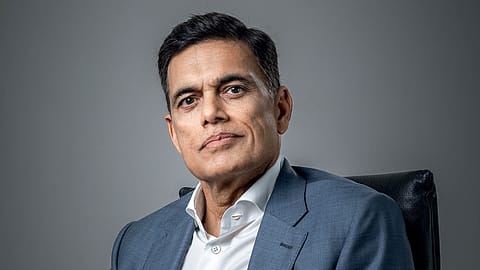Cargo Volumes Add To JSW Infra’s Growth
The JSW Group firm debuts this year as new ports and facilities add to a growing bottomline.

This story belongs to the Fortune India Magazine March 2024 issue.
THE YEAR WAS 2020. The world was struggling with Covid-19 and its effects. Companies were reducing costs to make balance sheets strong. But JSW Infrastructure, the captive port business of Sajjan Jindal-led JSW Group, had spent about ₹600 crore to build a sugar-cargo handling ecosystem — mainly roads, warehouses, bagging and debagging facility and screening equipment — around its Jaigarh port in the Ratnagiri district of Maharashtra, anticipating business from the hinterland sugar belt, 150-300 km away from the port.
Until then, the company only had captive cargo business of the JSW Group — largely iron ore, coking coal, limestone and steel accounting for 90% of its annual cargo handling. The development of Jaigarh port changed its fortune. Third-party cargo business picked up dramatically and now accounts for 35% of its overall cargo, up from 10% in 2020. It also helped JSW Infra file for IPO in December 2023, eventually helping it mop up ₹2,800 crore. Profit after tax (PAT) more than doubled to ₹740 crore in FY23, compared with ₹330 crore in FY22, on the back of a 41.79% YoY rise in total income at ₹3,373 crore.
"Jaigarh is one of our flagship ports. We started developing an ecosystem around it in 2020 when it was a captive port to serve JSW Energy and JSW Steel. As the hinterland of the sugar belt is located close to the port, we kept on adding capacity eyeing the opportunity in the sugar segment," says Arun Maheshwari, joint MD and CEO, JSW Infrastructure. Sugar producers were earlier dependent on the Mumbai port for cargo movement, but there were no proper roads. JSW Infra developed a 40 km road from the port. It also constructed warehouses with bagging and debagging facilities. "We created the entire ecosystem and made it attractive for sugar producers. We guaranteed against material loss of sugar. We also improved vessel performance at the port," says Maheshwari.
JSW Infra was launched in 2002 for captive service of JSW Steel and JSW Energy. Initially, ports were constructed in Goa, Jaigarh and Dharamtar (Maharashtra). After running it for 15 years as a 100% captive cargo handler, the group decided to operate JSW Infra as an independent business. "In 2019, we were doing only 6% external cargo of the total 35MT. It has increased to 93MT in 2023 with 35% third-party cargo," says Maheshwari.
The second-largest commercial port operator in India, JSW Infra also operates two terminals under operation and maintenance (O&M) agreements for a 41 MTPA cargo-handling capacity in the U.A.E. The business started with JSW Group’s acquisition of a port concession at Mormugao, Goa in 2002. Since then, the portfolio has expanded to 10 port concessions across the country.
During FY22 and FY23, the company’s installed cargo handling capacity grew at a CAGR of 15.27% to 170 MTPA, against Adani Ports and SEZ’s 585 MTPA (India). A majority of JSW Infra’s assets have the advantage of a deep draft, enabling direct berthing of large vessels. Draft is the vertical distance between the surface of water and the lowest point of the vessel.
The strategic location of the Jaigarh port also allows JSW Infra to operate a hub-and-spoke model of cargo handling with its ability to handle cape-size vessels with deadweight tonnage of 1.92 lakh tones, and trans-ship cargo to Dharamtar port (a riverine/lower draft port located at a distance of 18 nautical miles from Mumbai), according to company officials.
More Stories from this Issue
JSW Infra provides cargo handling, storage solutions and logistics services. It operates ports and terminals through port concessions, which range between 30 and 50 years, providing the company with long-term visibility of revenue streams.
The company has non-major ports located in Maharashtra, and port terminals across the industrial regions of Goa and Karnataka on the west coast, and Odisha and Tamil Nadu on the east coast. The port concessions are located near plants of group companies, enabling them to connect industrial hinterlands of Maharashtra, Goa, Karnataka, Tamil Nadu, Andhra Pradesh and Telangana, and mineral-rich belts of Chhattisgarh, Jharkhand and Odisha. The company has also invested in building evacuation infrastructure, including a fleet of mini-bulk carriers, rail and road networks and conveyor systems to attract customers.
JSW Infra now wants to broaden its cargo profile by expanding its geographical presence and diversifying revenue streams. It has developed two greenfield non-major ports, and four port terminals, besides acquiring three more port terminals in the country. A port is currently being developed at Jatadhar (Odisha) as well to cater to JSW Steel’s upcoming facility there.
The company, however, sees more growth within the country, aided by the economic revival. "The demography is attractive. There are high earning potentials and disposable incomes. The economy will grow despite global challenges. However, it cannot grow without touching the shores and India has a vast coastline," sums up Maheshwari.
(INR CR)